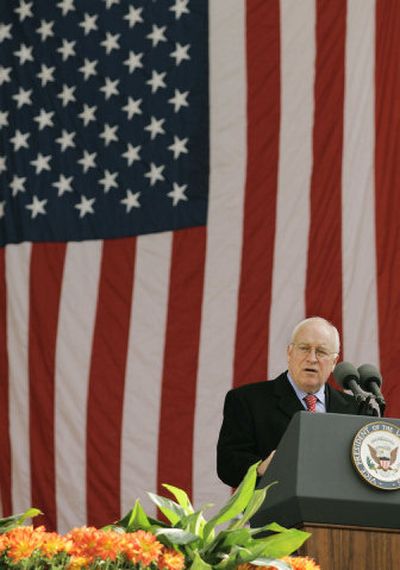Cheney’s once-vaunted influence, role waning

WASHINGTON – The most powerful vice president in American history no longer seems quite so powerful.
After five years at the center of President Bush’s inner circle, Dick Cheney has been hit with a host of problems that have tarnished his image and raised questions about his effectiveness. His top aide resigned after being indicted, his poll numbers have plummeted and even some of his fellow Republicans are questioning his judgment on issues related to Iraq and terrorism.
While Cheney is conducting business as usual, he’s meeting resistance as never before on Capitol Hill and within the Bush administration.
“There seems to be a kind of collective consciousness that he’s become weakened,” said Steven Clemons, a foreign policy specialist at the New America Foundation, a public-policy group that seeks to bridge partisan differences. “He’s going to continue to matter, but is he going to matter as much as he did before? Probably not.”
White House officials dispute suggestions that Cheney is on the outs with Bush, but there’s no question that the indictment last month of I. Lewis “Scooter” Libby, Cheney’s then chief of staff, has taken a toll. A poll conducted for NBC and the Wall Street Journal last weekend found that only 27 percent of Americans have a positive opinion of the vice president, down from 42 percent in January.
Most politicians in Cheney’s situation would scramble to change course, but he isn’t like most politicians. Days after Libby resigned, Cheney replaced him with David Addington, another longtime adviser, who helped draft a 2002 memo defending the use of torture in some circumstances.
The vice president courted more controversy by taking the lead role in trying to exempt the CIA from a ban on cruel and inhumane interrogation techniques.
“I just don’t think he cares,” said Rich Galen, a Republican consultant and a Cheney defender. “He believes that we are, in fact, at war. When you’re at war, you can’t be distracted by these kinds of things. He’s going to move ahead.”
Lea Anne McBride, Cheney’s spokeswoman, offered a similar assessment while rebuffing questions about his state of mind and his standing in the White House. McBride said Cheney was focused, “as always,” on “protecting the American people.”
When Bush first came to Washington, Cheney was widely viewed as the experienced, steady hand in an untested White House. Now he’s more likely to be pilloried as the hawk who helped push the president into a messy war that could drag on for years.
Longtime associates say Cheney has become obsessed with the threat of terrorism, especially the possibility of a biological, chemical or nuclear attack. By Bush’s own description, the vice president was “gung-ho” for war with Iraq well before the president committed to it.
Republicans who once bit their tongues or limited their criticism of Cheney to the cocktail circuit are starting to go public. Associates from Cheney’s days as defense secretary under President George H.W. Bush say they don’t understand him.
“I consider Cheney a good friend; I’ve known him for 30 years. But Dick Cheney I don’t know anymore,” Brent Scowcroft, national security adviser to the elder Bush, told The New Yorker magazine in a recent article that detailed Scowcroft’s disagreements with the current president.
In another high-profile break with the administration, Larry Wilkerson, who served as chief of staff under former Secretary of State Colin Powell, accused Cheney and Defense Secretary Donald H. Rumsfeld of leading a secretive “cabal” that hijacked foreign policy.
Fair or not, the torrent of criticism has damaged Cheney’s ability to serve as an administration spokesman.
“When was the last time he went on the Sunday talk shows? He increasingly seems limited to Rush Limbaugh or campaign appearances,” said Joel Goldstein, a law professor at St. Louis University who specializes in the role of vice presidents.
Other administration officials, mostly notably Secretary of State Condoleezza Rice, are pushing back against some of Cheney’s hard-line views. Cheney’s press for a CIA exemption from the ban on inhumane interrogation techniques is meeting strong resistance at the State Department and from officials in the intelligence community who are convinced not only that torture yields bad information but also that permitting it injures America’s image around the world.
A Republican consultant who insisted on anonymity to avoid an open break with the White House said Cheney also had lost influence on Capitol Hill.
“He’s the wrong messenger,” the operative said. “He’s really dropped off the planet up there.”